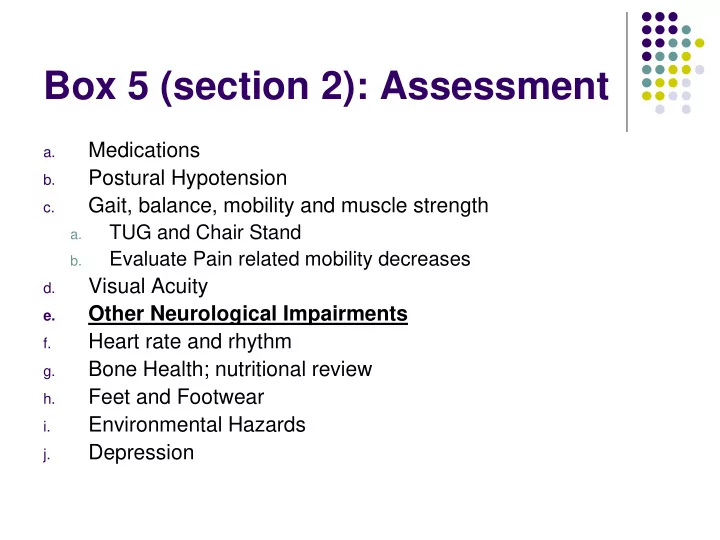

Box 5 (section 2): Assessment Medications a. Postural Hypotension b. Gait, balance, mobility and muscle strength c. TUG and Chair Stand a. Evaluate Pain related mobility decreases b. Visual Acuity d. Other Neurological Impairments e. Heart rate and rhythm f. Bone Health; nutritional review g. Feet and Footwear h. Environmental Hazards i. Depression j.
Box 5 – 2e. Other Neurological Impairments 3Ds - Dementia, Delirium, Depression Apraxia, decreased compensation, slow mentation Stroke, subdural hematoma, subarachnoid bleed, cerebellar disease, NPH Spinal stenosis, Myasthenia Gravis, ALS Peripheral or Autonomic neuropathy ETOH, DM, B12 … Parkinsonism (next slide)
Box 5 – 2e. Other Neurological Impairments DDx of Parkinsonism (Parkinson’s Plus) 1. Parkinson’s Disease (idiopathic parkinsonism) TRAP : Resting T remor, Cogwheel R igidity, A kinesia / bradikinesia – (slowness), P ostural Instability (decreased balance, falls) 2. Vascular parkinsonism TRAP, no response to Parkinson's meds, basal ganglia strokes – 3. Drugs (antipsychotics, GI drugs [stemetil, maxeran]) 4. Lewy Body disease Dementia, Longstanding Hallucinations, Longstanding Fluctuation – 5. Progressive Supranuclear Palsy (PSP) Loss of downward gaze and then all eye movements, depression, – anxiety, psychosis, dementia 6. Late Alzheimer’s 7. Multisystem atrophies (MSA – multiple neurologic symptoms) 1. Shy-dragger, OPCD, SND etc
Box 5 – 2e. Other Neurological Impairments Vertebrobasilar Insufficiency Provoked by head or neck movement Seconds to minutes Other brainstem symptoms Diplopia Dysarthria Facial numbness Ataxia Reduced vertebral artery flow on doppler or angiography Treatment: Behaviour modification
VERTIGO Vertigo Non-vertigo Central Peripheral Dysequilibrium Presyncope BPPV Meniere's Vestibular Neuronitis Labyrinthitis Medication Non-specific dizziness
Vertigo Feeling of movement when one is stationary (does not need to be spinning) Central – Cranial Nerve 8 (Vestibular Nerve) within Central Nervous System (Brain) Peripheral – Ear
Central Vertigo Central = Central Nervous System DDX Migraines, MS, trauma, strokes, tumor etc. Need neuroimaging +/- ENT special studies (refer to ENT or neurology) Look for Neurological signs suggesting brain or brainstem pathology: Gait and limb ataxia Cranial nerve findings Slurred speech, diplopia Focal weakness/numbness Incontinence
Peripheral Vertigo Peripheral = inner ear or vestibular system - no CNS neurological signs except vertigo, nausea and decreased hearing (all explained by inner ear or vestibular system dysfunction) - refer to ENT if does not resolve over time Common Causes (hard to differentiate): Benign Paroxysmal Positional Vertigo (BPPV) 1. Meniere’s Disease 2. Vestibular Neuronitis 3. Labyrinthitis 4. Motion Sickness (not reviewed) 5.
1. BPPV or BPV: BENIGN (Paroxysmal) POSITIONAL VERTIGO • Commonest Cause of Chronic Vertigo in the Elderly. Sometimes associate with trauma. • Cause: Calcium crystals dislodged and move to semi-circular canals • Symptoms and signs: • Sudden onset vertigo lasting seconds to minutes, episodic, brought on by changes in head position (rolling over, bending, looking upward) • Nausea • Rotatory (torsional) Nystagmus where top of eye rotates toward the affected ear in twitching fashion
BPPV diagnosis: Dix-Hallpike or Nylen Barany Test Rotatory Nystagmus starts 5 – 10 seconds after positioning Nystagmus lasts 5 – 120 seconds Visual fixation does not suppress Nystagmus Nystagmus suppressed / fatigued by repeated manoeuvre
BPPV treatment : Canalith Repositioning Procedure = EPLEY’s Maneuver Exercises that provoke vertigo used to reposition crystalline debris (the dislodged Calcium Crystals) 5 minutes in each position, repeat 3 times
2. Meniere’s Disease Cause: Excess fluid in inner ear Symptoms and Signs: Attacks of Vertigo lasting minutes to hours (max 24 hours) – unexpected, not triggered by position Fluctuating progressive hearing loss (one or both ears) Unilateral or bilateral tinnitus Sensation of fullness or pressure in ear. Nausea, vomiting, sweating Horizontal Nystagmus
3. Vestibular Neuronitis Vestibular Neuronitis = inflammation of vestibular nerve Symptoms and Signs; Vertigo + Nausea and Vomiting unexpected, not triggered by position +/- Nystagmus Unlike labrynthitis (next topic) is NOT associated with auditory symptoms (no tinnitus or decreased hearing) May be associated with prior viral upper respiratory tract infection
4. Labyrinthitis Labyrinthitis – inflammation of inner ear. Symptoms and Signs: Acute onset of non-position dependent vertigo (often severe) +/- nausea and vomiting +/- hearing loss and tinnitus May occur after viral or bacteria infection (especially upper respiratory tract infection), or head injury Lasts 1 – 6 weeks but can have residual symptoms for months or years
Recommend
More recommend